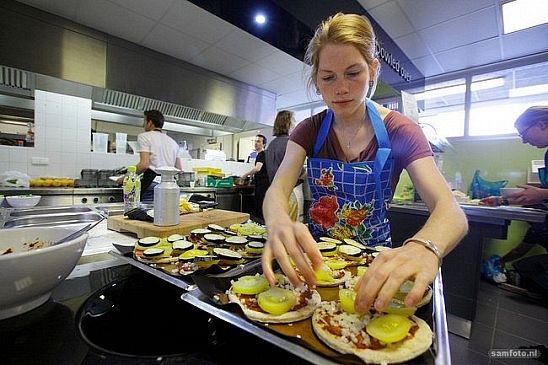Do you have any idea how much food goes wasted in this country? On June 18, 2015, a unique cooking competition brought groups of students together in Delft to put a spotlight on the issue.
Called Taste the Waste, the event was sponsored by Milieudefensie Delft, the local chapter of a Dutch organization focused on making the Netherlands more sustainable and equitable. “With this event, the aim of team Milieudefensie Delft is to reach or increase awareness with consumers of their food wasting behaviour and related recurring habits,” said Nicolet Baas, a core team member of the local branch. She said they also wanted to offer simple and feasible ways for people to minimize the amount of food they waste.
A staggering amount of food is discarded every day by supermarkets because it doesn’t look aesthetically perfect and because of stringent regulations on expiration dates. And much of that food is actually still good and edible. But it’s not just industry wasting food. According to one environmental organization called Milieu Centraal, the average person in the Netherlands throws away almost 50 kilograms of good food annually. The organization estimates this translates to about €155 per person each year. The effect of this is more than the obvious loss of food, but there is also a significant impact on the environment. It results in unnecessary pollution and wasted resources needed to grow, package and distribute the products.
Events like Taste the Waste attempt to bring attention to the issue with a fun twist. In this case, three teams of students participated in the competition representing TU Delft, InHolland (university of applied sciences) and UNESCO-IHE. Each team was required to prepare a three-course vegetarian menu for around 30 people using only “wasted” foods. Ingredients like vegetables, fruit and bread were provided by the Greenery and some local stores, including vendors from the Delft weekly outdoor market. The students were also free to bring their own additional (waste) ingredients.
The teams were judged on their ability to create dishes of a professional quality, represent maximum waste, to be original (creative and inspirational to others) and good presentation. Fifty percent of the vote was from a jury that included a chef and representatives from Avalex, Sodexo and Milieudefensie. The other half of the vote came from the general audience.
The TU Delft team ended up winning the event, with both jury and guests voting in their favor. According to organizers, the jury appreciated their creativity in bringing food waste from the restaurant at the university as well as from the kitchen of their student house.
For more information visit their website.



Comments are closed.